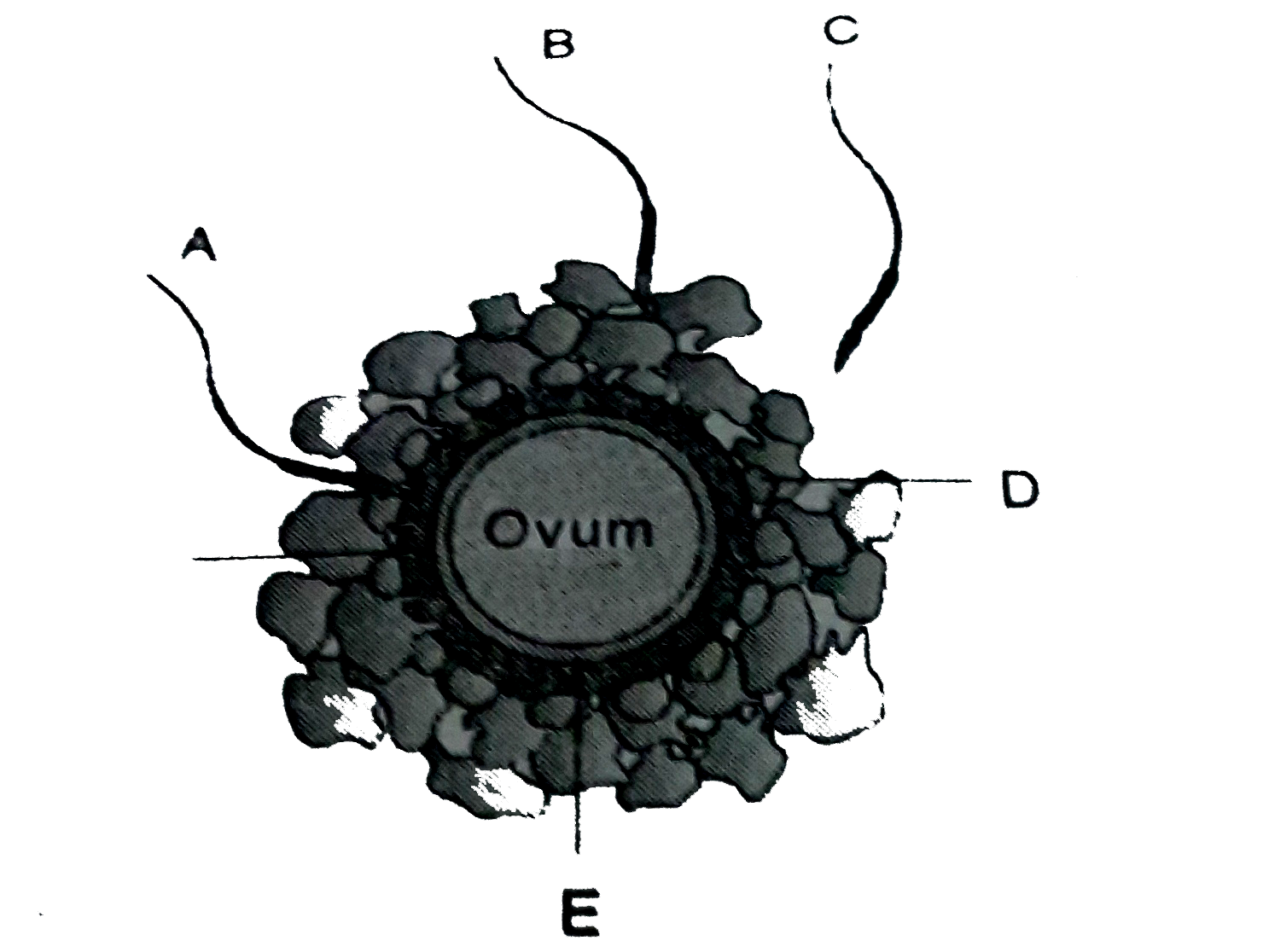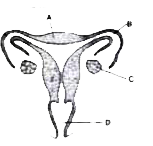The main function of the fimbriae of the Fallopian tube in females is to:
(a) release ovum from the graffian follicle
(b) Make necessary changes in the endometrium for implantation
(c) help in the development of corpus luteum
(d) help in the collection of the ovum after ovulation
release ovum from the graffian follicle
Make necessary changes in the endometrium for implantation
help in the development of corpus luteum
help in the collection of the ovum after ovulation
The correct Answer is:D
To solve the question regarding the main function of the fimbriae of the Fallopian tube in females, we will analyze each option provided and determine which one accurately describes the role of the fimbriae.
1. Understanding Fimbriae:
- Fimbriae are finger-like projections located at the end of the Fallopian tubes. They play a crucial role in the female reproductive system.
2. Analyzing Each Option:
- Option (a): "Release ovum from the Graafian follicle"
- This option is incorrect. The release of the ovum from the Graafian follicle is primarily triggered by hormonal changes, particularly the surge of Luteinizing Hormone (LH), not by the fimbriae.
- Option (b): "Make necessary changes in the endometrium for implantation"
- This option is also incorrect. Changes in the endometrium for implantation are regulated by hormones such as estrogen and progesterone, not by the fimbriae.
- Option (c): "Help in the development of corpus luteum"
- This option is incorrect. The development of the corpus luteum occurs after ovulation and is influenced by hormonal factors, not by the fimbriae.
- Option (d): "Help in the collection of the ovum after ovulation"
- This option is correct. The fimbriae are specifically designed to help collect the ovum released from the ovary and guide it into the Fallopian tube.
3. Conclusion:
- After analyzing all the options, the correct answer is (d) help in the collection of the ovum after ovulation.
Final Answer:
The main function of the fimbriae of the Fallopian tube in females is to help in the collection of the ovum after ovulation (Option d).
---
- Fimbriae are finger-like projections located at the end of the Fallopian tubes. They play a crucial role in the female reproductive system.
- Option (a): "Release ovum from the Graafian follicle"
- This option is incorrect. The release of the ovum from the Graafian follicle is primarily triggered by hormonal changes, particularly the surge of Luteinizing Hormone (LH), not by the fimbriae.
- Option (b): "Make necessary changes in the endometrium for implantation"
- This option is also incorrect. Changes in the endometrium for implantation are regulated by hormones such as estrogen and progesterone, not by the fimbriae.
- Option (c): "Help in the development of corpus luteum"
- This option is incorrect. The development of the corpus luteum occurs after ovulation and is influenced by hormonal factors, not by the fimbriae.
- Option (d): "Help in the collection of the ovum after ovulation"
- This option is correct. The fimbriae are specifically designed to help collect the ovum released from the ovary and guide it into the Fallopian tube.
- After analyzing all the options, the correct answer is (d) help in the collection of the ovum after ovulation.
The main function of the fimbriae of the Fallopian tube in females is to help in the collection of the ovum after ovulation (Option d).
Similar Questions
A : Most birds posses only the left ovary and left oviduct for conveying the ovum released from the ovary
R : The avian ovary does not form a corpus luteum from the ruptured ovarian follicle which undergoes rapid shrinkage.
(a) If both Assertion & Reason are true and the reason is the correct explanation of the assertion then mark a
(b) If both Assertion & Reason are true but the reason is not the correct explanation of the assertion then mark b
(c) If Assertion is true statement but Reason is false then mark c
(d) If both Assertion and Reason are false statement then mark d
View SolutionThe following is the illustration of the sequence of ovarian events ''a'' to ''I'' in a human female :

(a) Identify the figure that illustrates corpus luteum and name the pituitary hormone that inhuences its formation.
(b) Specify the endocrine function of corpus luteum. How does it influence the uterus? Why is it essential?
(c) What is the difference between “d” and “e”?
(d) Draw a neat labelled sketch of Graafian follicle.
View SolutionName the functions of the following.
(a) Corpus luteum
(b) Endometrium (c) Acrosome
(d) Sperm tail
(e) Fimbriae
View Solution(a) Explain the menstrual phase in a human female. State the levels of ovarian and pituitary hormones during this phase.
(b) Why is follicular phase in the menstrual cycle also referred as proliferative phase ? Explain.
(c) Explain the events that occur in a graffian follicle at the time of ovulation and there after. (d) Draw a graffian follicle and label antrum and secondary oocyte.
View SolutionGiven below is the diagram of a human ovum surrounded by a few sperms. Study the diagram and answer the following questions :

(a) Which one of the sperms would reach the ovum earlier ?
(b) Identify 'D' and 'E'. Mention the role of 'E'.
(c ) Mention what helps the entry of sperm into the ovum and write the changes occuring in the ovum during the process.
(d) Name the specific region in the female reproductive system where the event represented in the diagram takes place.
View SolutionThe figure given below represents the female reproductive system of a mammal. Parts indicated by the guidelines A to D are as follows:

(A) Uterus
(B) Fallopian tube (oviduct)
(C) Ovary
(D) Vagina
(a) Give appropriate terms for each of the following:
(i) The onset of reproductive phase in a young female.
(ii) Rupture of follicle and release of ovum from the ovary
(iii) Monthly discharge of blood and disintegrated tissues in human female.
(iv) Process of fusion of ovum and sperm.
(v) Fixing of developing zygote on the uterine wall.
(vi) The permanent stoppage of menstruation at about the age of 45 years in a female.
(b) State the functions of the (0) Placenta (ii) Amniotic fluid. [ICSE 2004, 2015]
(c) Using the symbol "X' indicates the region in the diagram where fertilisation occurs.[ICSE 2004)
View SolutionGiven below are four statement (a-d) regarding assisted reproductive technologies :
Select the option which include one only :
(a) ZIFT - The zygote or early correct one (only blastomere) transferred into the fallopian tube
(b) ICSI - A sperm is directly injected into the fallopian tube to form an embryo in the laboratory
(c) IUI - The semen collected either from the husband or healthy donor is artificially introduced either into the vargina or into the uterus
(d) GIFT - Transfer of zygote collected from a donor into the fallopian tube of another female who cannot produce one but can provide suitable environment for fertilisation and development.
View SolutionWhich of the following statement is wrong?
(a) Sertoli cells provide nutrition to the developing male germ cells
(b) Leydig cells synthesizes and secrete androgens
(c) Secretions of acrosome help the sperm to enter the cytoplasm of the ovum
(d) Secondary spermatocytes are diploid
View SolutionWhat does the filiform apparatus do at the entrance into or Function of filiform apparatus is to
(a) Brings about opening of pollen tube
(b) Guides pollen tube from synergid to egg
(c) Helps in the entry of pollen tube into synergid
(d) Prevents entry of more than one pollen tube into embryo sac
View SolutionIn the first biological applicativon of bucky ball , chemists at the University of Califorminaat San F Francisoc and Santa Barbra made a discovery in 1993 that could help I designing drugs to rtreat AIDS. The human immunodeficienrcy virus (HIV) that causes AIES reproduces by syntheising a long protein chain , which is cut into smaller segments by an enzymecalled HiV-proteases . ONe way to stop AIDS, then might be to inacivate the enzyme. when the chemists reacted a water-soluble derivative of bucky ball with HIV-protease , they found that itbinds to the portion of th enzyme that would ordinarily clareve the repreouctive protein , preventing the HIV virus from reproducing . Consequently the virus could no bnolgre infect the human cells they had frown in the laboratory . The buycky ball compound itself is not a suitable drug for use against AIDS because of potential side effects and delivery difficaultes , but it does provide a model for the development of such drugs
Consider following statements about bucky ball :
A , It is also called fullerene
B: It is also called Buckminster fullerene
C: Bucky tubes (made of fullerenes ) are several times stronger than steel wires
D: Bucky ball is a plastic polymer
Select correct statement (s) :
View Solution
